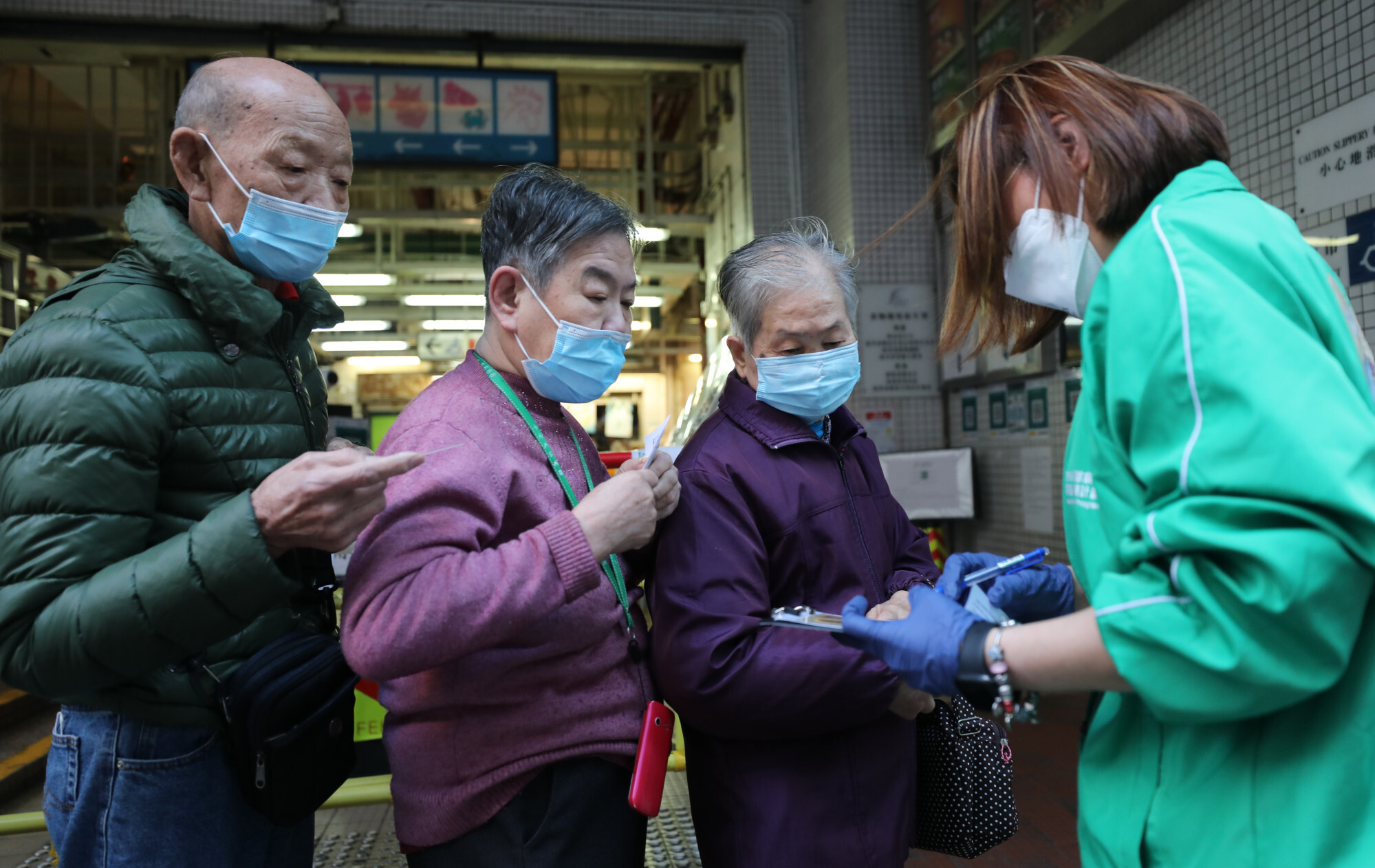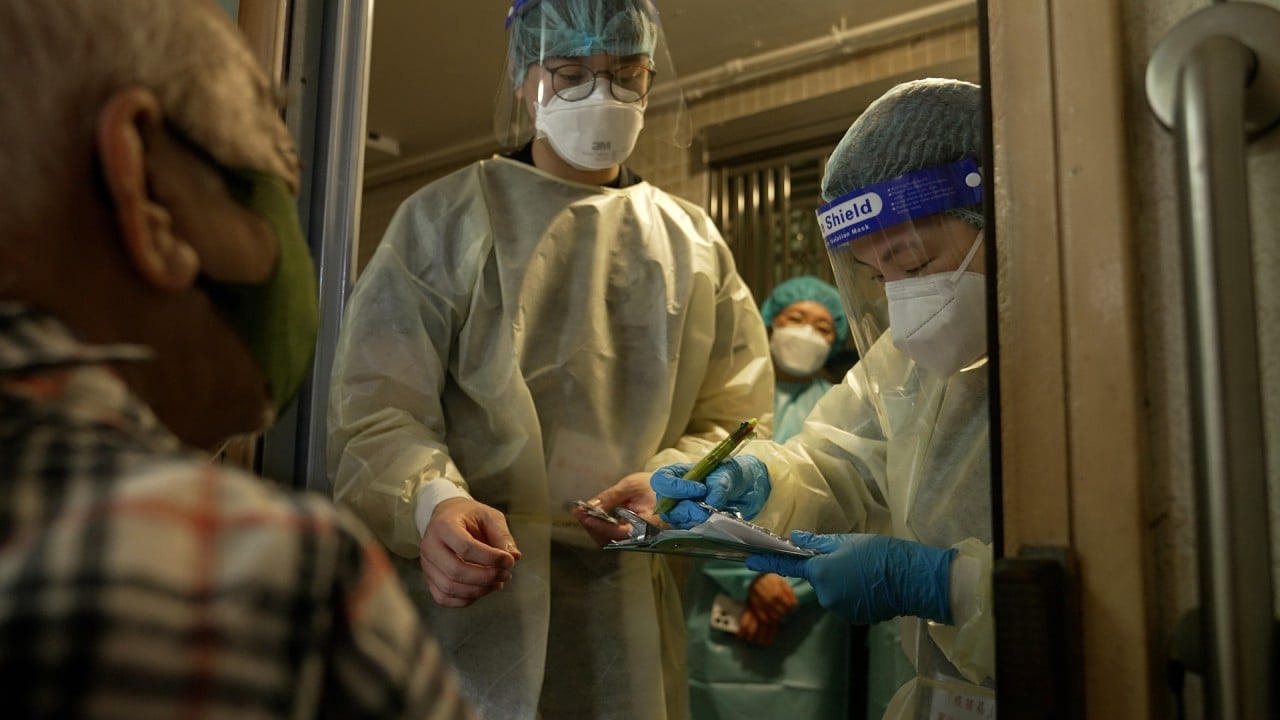
Door-to-door vaccine scheme for homebound Hongkongers to launch next week but NGOs warn many more in need of coronavirus jabs
- Inoculation drive for homebound seniors and disabled residents aims to vaccinate 10,000, with option to expand initiative based on demand
- But NGO community organiser warns goal is too modest and says more than 100,000 seniors with mobility issues in need of jabs
Social service agencies and a lawmaker have called for the door-to-door inoculation drive to cover more homebound people to curb the surging fifth wave of Covid-19 infections.
Secretary for the Civil Service Patrick Nip Tak-kuen, who oversees the inoculation drive, said on Sunday that there were about 50,000 elders and disabled people with mobility issues who were in need of the service.
The programme is set to be carried out by the Hong Kong Council of Social Service (HKCSS), a group representing non-government social service agencies, along with the Federation of Medical Societies of Hong Kong.
On Tuesday, HKCSS business director Cliff Choi Kim-wah said they had already recruited enough doctors, nurses, and social workers for the programme’s outreach teams, which would visit homes and conduct basic health assessments before vaccinating eligible recipients from next Monday.
He said HKCSS service users would be invited to participate in the initiative first, but a hotline would be set for other eligible residents who were willing to take part.
Choi said the scheme had the resources to vaccinate 10,000 people with three doses of the Chinese-made Sinovac vaccine each and expected distribution of the first shots would be completed by the end of April.
“But we will not set a limit on the number of people who can benefit from the programme,” he said, adding they would consider expanding services to cover more people if necessary.
Choi said social workers from the outreach teams would contact residents before a home visit, while doctors would evaluate the recipients’ health conditions. If a patient was in good health, they or their family members would be asked for their consent before the jab was administered.
“This is a rare opportunity with home visits by doctors. We hope more residents will take part in it and their family members will encourage them to do so,” he said.
Ivan Lin Wai-kiu, a community organiser with the Society for Community Organisation who works with the elderly, said the HKCSS had contacted the group to ask if they could refer people in need of the vaccination service.
But Lin said the programme’s target of vaccinating 10,000 homebound elderly and disabled residents was too small, estimating there were more than 100,000 seniors with mobility issues in need of jabs.
“Many of them have difficulties going out to get vaccinated, are afraid of leaving home for fear of being infected outside, or are unable to secure a booking,” he said.
The community organiser also warned of “hidden elderly”, seniors without family support and unknown to community help networks, who were also poorly informed about the vaccination programme and had no access to it.
Lin urged authorities to locate and support isolated seniors, by boosting the promotion of the initiative, through measures such as setting up a support hotline.
He also suggested featuring promotions on television and at shopping malls, where hidden elders might be able to see it.
Lin added that the number of seniors willing to get inoculated had surged during the fifth wave, but some were hesitant because of health concerns.
He said more seniors would be motivated to get their jabs if doctors could evaluate their health conditions and address any concerns, as well as giving exemption certificates to those who were unsuitable for a vaccine.

Amy Wang Su-qin, chief executive officer of the People of Fortitude International Mutual Aid Association for the Disabled, said she believed there were more unvaccinated than inoculated people among Hong Kong’s more than 200,000 disabled residents, but added that more were willing to get their jabs during the fifth wave.
She said most of the more than 700 members of her organisation were living alone and needed to get inoculated, including people with physical disabilities, visual impairments and hearing loss.
“Many disabled persons live alone without family support. They find it difficult to move around to get a jab, while some are worried about going out and getting infected,” she said, urging the HKCSS to vaccinate disabled residents as soon as possible.
Social welfare legislator Tik Chi-yuen said he believed that more than 100,000 residents were in need of the vaccination service.
The lawmaker called on the government to play a bigger role by allocating more manpower and resources to the initiative as well as boosting departmental cooperation to find those in need, rather than relying solely on NGOs.
With the combined efforts of NGOs and local authorities, Tik said he believed the programme could cover about 90 per cent of those in need, but urged both groups to immediately vaccinate all known eligible residents while searching for other recipients.
“They are the most vulnerable, high-risk group. We must vaccinate them as soon as possible,” he said.
A government spokesman said on Tuesday the door-to-door vaccination programme by the HKCSS was a good initiative, adding that authorities were also planning to provide home inoculation services for those with mobility issues.
In addition to providing jabs to homebound residents, the government has sent outreach teams to vaccinate seniors and disabled persons at more than 1,000 care facilities by this week.


